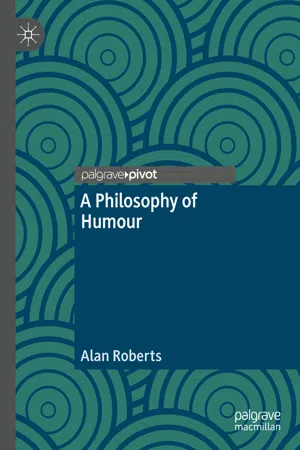People say to start with a joke, but I’m going to go one better by starting with the funniest joke in the world:
This joke was recently voted the funniest in the world during an international poll with over 40,000 jokes and almost 2,000,000 ratings (Wiseman 2015, 217). So, if you have not promptly died of laughter as per Monty Python’s sketch ‘The Funniest Joke in the World’, then your sense of humour is malfunctioning and in need of some maintenance. Luckily, this book can provide that maintenance because it is titled A Philosophy of Humour. Let’s unpack that title starting with the word ‘philosophy’.Two hunters are out in the woods when one of them collapses. He doesn’t seem to be breathing and his eyes are glazed. The other guy whips out his phone and calls the emergency services. He gasps, ‘My friend is dead! What can I do?’ The operator says, ‘Calm down, I can help. First, let’s make sure he’s dead.’ There is a silence, then a shot is heard. Back on the phone, the guy says, ‘OK, now what?’
The word ‘philosophy’ comes from the Greek words philo and sophia meaning ‘love’ and ‘wisdom’, so philosophy is literally ‘the love of wisdom’. What this essentially amounts to, I would argue, is using reason to address fundamental questions. Questions like:At this point philosophy and humour may seem an odd mix. After all, philosophy is clearly a weighty discipline and humour a light topic. But there are good reasons to consider humour a worthwhile topic for philosophical study.
- What is the meaning of life?
- Do I have free will?
- Is there a God?
- How should we organise society?
First, humour is universal across humanity. Laughter has been discovered in every known human culture and can be experienced by almost everyone (Apte 1985; Lefcourt 2001). The sound of laughter is one of the few non-verbal expressions which remains recognisable from one culture to another (Sauter et al. 2010). Moreover, the average person laughs around 17 times a day and at the rate of about 5 laughs for every 10 minutes of conversation (Martin and Kuiper 1999; Vettin and Todt 2004).
Second, humour is important to humanity. Your sense of humour determines what books you read, what films you watch and what relationships you have. Both men and women prefer romantic partners with a good sense of humour and sexually attractive people are more likely to be seen as funny (Lippa 2007; Cowan and Little 2013). In addition, married couples who use laughter when discussing relationship conflicts not only feel better afterwards but also report higher levels of marital satisfaction and stay together for longer (Whalen 2010; Yuan et al. 2010).
Third, humour is beneficial for humanity. Laughter is followed by a period of muscle relaxation with a corresponding decrease in heart rate and blood pressure (Bennett and Lengacher 2008). Humour helps people cope with stressful situations to the extent that laughter therapy can even improve the quality of life of those affected by cancer (Cho and Oh 2011; Demir 2015). Furthermore, laughter enables people to think more broadly and flexibly when approaching problems that demand a creative solution (Martin and Ford 2018, 161–162).
Surely all this makes humour a legitimate topic to furrow a few philosophical brows. Great philosophers such as Plato, Aristotle, Kant, Hobbes and Schopenhauer have certainly thought so. Wittgenstein even said that ‘a serious and good philosophical work could be written that would consist entirely of jokes’ (Malcolm 1984, 27–28).1 The notion of sitting down with a joke-book and becoming wiser after a few chuckles does indeed sound appealing. Though, sadly, this book is not a philosophical work consisting of humour but rather a work about humour. If philosophy is using reason to address fundamental questions, then a philosophy of humour uses reason to address fundamental questions about humour. The fundamental question which this book addresses is:You see, humour is a funny thing—everyone knows it but no-one knows what it is.
- What is humour?
An immediate response to the question ‘What is humour?’ might be to point out humour in the world, including text like Groucho Marx’s quote ‘I intend to live forever or die trying’, images like the New Yorker cartoon of Che Guevara wearing a Bart Simpson t-shirt, audio like the Flight of the Conchords’ song Most Beautiful Girl (in the Room) and videos like the boxing scene in Charlie Chaplin’s film City Lights. But this immediate response misses the mark as these are all examples of humour whereas the question, taken philosophically, concerns humour itself. To make this clearer the question could be rephrased as ‘What does the word ‘humour’ mean?’
An immediate response to this question might be to look up the word ‘humour’ in the dictionary. But doing so only reveals an uninformative circle of definitions that cycles between ‘humour’, ‘amusement’ and ‘fu...
